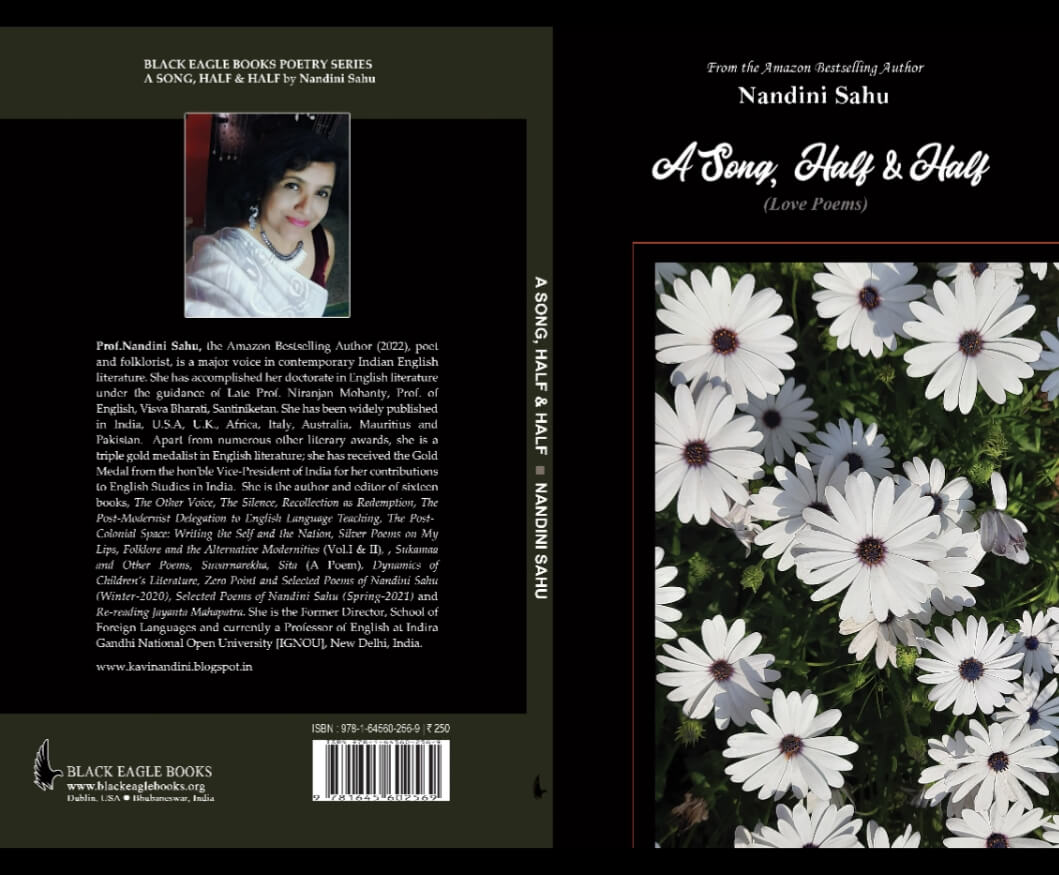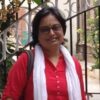Pushpa critiques and reviews Nandini Sahu’s recent love poetry collection, A Song, Half & Half. An exclusive for Different Truths.

Prof. Nandini Sahu’s recent poetry collection, A Song, Half & Half reached me as a breath of fresh air. I went through the poems with a passionate intensity that the poet too might have experienced, while writing these intense poems from her ‘covid bed’. She herself states it in the Preface of the book. The Preface sets the tone of the entire collection, quoting Helen Keller in Divining the Body, “Paradise is attained by touch.”
Nandini, a major voice in contemporary Indian English poetry is a prolific writer with seventeen published books to her credit. Her poetic signature is best exemplified in her long narrative Sita (A Poem) in which Prof. Sahu demystifies the myth of Sita, misrepresented as the demure and docile wife of Rama, the Maryada Purushottam. Her work finds resonance among scholars of folk and gender studies alike. Her other published volumes of poetry include: The Other Voice, The Silence, Silver Poems on My Lips, Sukamma and Other Poems and Zero Point, Selected Poems of Nandini Sahu (Vol I & II).
A Song, Half & Half makes Nandini Amazon’s Best-selling Author, 2022, within a few days of the publication of the book.
A Song, Half & Half makes Nandini Amazon’s Best-selling Author, 2022, within a few days of the publication of the book. Quoting Amazon’s book description page about the poetry collection, “A Song, Half and Half is a volume of Nandini’s love poems. The poems play around the poet’s ideas on complex human emotions, relationships, romantic love, even humour and of course the existential issues of life.
The tone and tenor of these poems are a different ball game altogether; here one can notice a sea change in the moods, modes and mores of the mythical poet Nandini. Here, she reveals as much as she conceals. Penned as soliloquies from her covid bed, in memory of her love, and then the rekindling of love in her ‘Ocean’, these are her politically incorrect poems. Here Nandini celebrates an anonymous love that is still knocking her door, and the personae has left the door ajar.”
Falling in love for her begins with intense intimate emotions and gradually scales up to the “realm of thought” …
In A Song Half & Half, it comes as no little surprise that Nandini’s roller coaster experiences with the most complex of human emotions are interspersed with humour, irony, longing, pathos, romance, burlesque, mellowed acceptance, and an abiding philosophy that she cultured over a period. Falling in love for her begins with intense intimate emotions and gradually scales up to the “realm of thought”, as she quotes Dr. Anand Prakash in her Preface.
For her, love springs “back in vivid hues” (An Autumnal Duet,33) when she is feeling the “best of [my] feelings – contented, romantic, ebullient, jovial, strong, real, feminine.” (A Man Like You,17) Her poem, Shipwrecked Souls defines her dream lover – erudite and passionate, consistent and compassionate.
To quote the poet herself from the Preface while talking about the uniqueness of this collection, “All the poems are about my moods, modes and mores, they are about the roller coaster rides that I had, and of course about the most complex human emotions. My readers and researchers may find these poems very different from my earlier poems. Mythical poet, folklorist Nandini writes romantic, jovial, humorous, light poems, while talking about existential issues at the same time! I have always advocated social mobility literature, Witness Literature, backed with myth and folklore as my poetic tools. The mood of these poems is unlike my other collections.”
Nandini is aware that love comes with a price tag.
Nandini is aware that love comes with a price tag. In the poem, A Welcome World she says with a knowing resignation, “Loving you is like going to war.” and again in, My Tranquil City, Tonight, she affirms, “One comes broken, bruised from the battle, for sure.” but she would “go with the flow rather than stand in the mid of nowhere.” (A Song Written Half and Half, 23) Love is an all-encompassing fire, a “tender hurt”, “a bliss.” (Bottomless,36) Loving her Muse “is inhaling a thousand roses in spring knowing tomorrow the air will be unfeelingly untaken.” (Filling the Molecules,51) She knows “where there is intense love there is also penetrating disquiet concerted hurt.” (Reaching the Island,87)
The poems in the anthology are personal, profound, practical, and philosophical. She asks, “who wants to just remain ‘alive’, simply ‘exist’? Let them merely exist in your world with their existential issues while I live you, live in you, breathe you like oxygen. our energetic collaboration keeps me going, my friend, philosopher and guide! (‘Alive’ and ‘Living’,29)
But then when in the name of social custom, the runner is pulled from under her feet, this “woman in transit, a stopover… trust-broken”, (The Woman that was Me is Gone,101) nurses no ill will. She savours “only the intimate part” of love… a paper cake that you cannot eat” (Am All Ears to You, Love! 31)
In candid honesty, which is the hallmark of her writings, she admits with floundering fatigue that “storms also get tired.”
In candid honesty, which is the hallmark of her writings, she admits with floundering fatigue that “storms also get tired.” She is willing to free her love of all debts. (Debt,41) Her emotions only betrayed in a smile that “is the sign of some silent, ancient ache (Eyes Well Up,47) and eyes that “melt even without tears.” (Eyes,49)
Her poems are intense, intimate, and deeply individualised. Reading them, one is literally swept off one’s feet in the torrential gush of emotions. She can sound flippant and frivolous; profound and philosophical in the same breath. Her love is essentially human and craves for the “physical-digital presence.” (We Have Earned our Tomorrow,110) She also holds it on a pedestal and almost deifies it. “Now let me live plentiful to die at love’s feet.” (Hymn to Chant, 63).
Nandini’s love poems are youthful expressions of a mature heart mellowed with an unbridled abundance…
Nandini’s love poems are youthful expressions of a mature heart mellowed with an unbridled abundance and capacity to live and love. The spurned heart refuses to accept the cold logic of “worldly snags” and is optimistic that “time will take over all that is sombre and gray” and in the “memory lane” of their love her Muse would discover her solitary self and “then for [her] he would crave.” Till then she would “live-love-breathe” with no “qualms.” (You are Another Me,116/117)
Of all the poems in the collection, the poem, Half of Her Lovers are Half the World Away, expresses her tremendous capacity to love, sans judgments to her lover:
Her ‘men’ knew, she was the brimming vessel with an eternal capacity to pour… Her dry sardonic wit made them only fall in love more with rationality. Lost in time, with the audacity of hope, she was found in eternity; turning her wounds into wisdom, an expert at the law of diminishing marginal utility!” She would rather divinise love the most complex human phenomenon by living it: “Her ‘men’ every so often left her drained, high and dry. Some other times they cared to say a proper goodbye. In any case, she didn’t judge them, she just did low lie… Above her outer skin, there were wordless walls with a fistful of sky. With time, invariably, her men turned into distant memories…her own story lay buried at someplace in a vault.” (Half of Her Lovers are Half the World Away”, 58/5
In her poems, Nandini invites her readers to a 360-degree view of love. In a world rid with the pandemic and war-torn strife, these poems breathe the elixir of love and life; optimism and hope. They are a bold assertion of her question, “Will she ever be her phoenix? (The Woman that was Me is Gone,102).
Cover Photo sourced by the reviewer





 By
By
 By
By
 By
By
 By
By